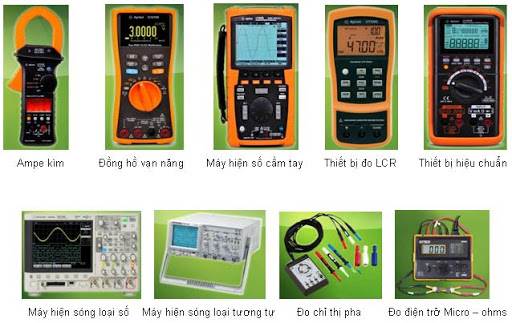Introduction to the College-Level Electrical Measurement Program
On February 10, 2019, Circular 48/2018/TT-BLDTBXH issued by the Ministry of Labor, Invalids and Social Affairs (BLDTBXH) stipulating the minimum knowledge volume and competency requirements that learners must achieve after graduating from intermediate-level and college-level programs in the fields of electrical engineering, electronics, and telecommunications, will take effect.

Introduction to the field of electrical measurement at college level - Illustrative Image
As stipulated in the regulation on the minimum volume of knowledge, requirements for competencies that learners must achieve after graduating from the intermediate level, college level in the field of electrical measurement, issued together with Circular 48/2018/TT-BLDTBXH, the field of electrical measurement at the college level is a profession where practitioners perform tasks such as operation, experimentation, inspection, calibration, and management of the measurement system in substations of the power transmission grid (with voltage levels from 220 kV to 500 kV), distribution grid (with voltage levels of 110 kV or less) and power plants, meeting level 5 requirements in the Vietnam National Qualifications Framework.
The main tasks of the profession include: Experimenting, adjusting, inspecting, calibrating, and installing electrical measurement equipment including various types of direct and alternating current meters installed on electrical cabinets to measure voltage and current; various types of active power meters and reactive power meters; induction-type and electronic-type electric meters used for single-phase and three-phase power grids. Additionally, there is the calibration of handheld electrical measurement devices, the calibration of measurement standards such as current source standards, voltage standards, resistance standards, etc., the inspection of insulation resistance measuring devices (megaohm meters), and earth resistance measuring devices (terometers).
Professionals in electrical measurement work in laboratories, maintenance workshops belonging to power plants, transmission substations, intermediary substations; electrical measurement inspection and adjustment centers; power companies; production workshops for electrical measurement equipment and enterprises trading in electrical equipment.
Requirements for the profession: It is a profession with a high degree of accuracy, so workers must go through specialized training schools in electrical measurement. Due to the complexity of the profession and work environment, workers must be healthy, calm, quick in response, creative, and have a high sense of discipline in their work, and particularly must strictly adhere to the Electricity Law, Measurement Law, and business processes of the Vietnam Electricity Group.
Minimum volume of knowledge: 2,400 hours (equivalent to 86 credits).
Additionally, after graduation, learners have the competencies to meet the requirements at job positions in the profession, including:
- Testing, inspecting transformers;- Testing, inspecting current transformers and voltage measuring transformers;- Testing, inspecting capacitors;- Testing, diagnosing faults in high voltage electrical equipment;- Managing the operation of electrical equipment;- Installing electrical measurement equipment;- Inspecting electrical measurement systems;- Inspecting, calibrating energy metering devices.
Detailed content can be found in Circular 48/2018/TT-BLDTBXH, issued on December 28, 2018.
Le Vy
- Responsibilities of officials of the Ministry of Finance of Vietnam when they are issued Official Passports from November 19, 2024
- 06 solutions to enhance the effectiveness of social policy credit in the new phase in Vietnam
- Financial support level for the purchase and repair of transportation vehicles for the Economic - National Defense Corps in Vietnam from December 30, 2024
- Financial support levels for purchasing and repairing of medical equipment for the Economic - National Defense Corps in Vietnam from December 30, 2024
- Latest regulations on management and use of passports for officials and public employees of the Ministry of Finance of Vietnam
- New regulations on the procedures for veterinary sanitation inspection in Vietnam from January 6, 2025
-

- Responsibilities of officials of the Ministry ...
- 16:00, 23/11/2024
-

- 06 solutions to enhance the effectiveness of social ...
- 15:32, 23/11/2024
-

- Guidelines for registration and organization of ...
- 11:53, 23/11/2024
-

- Contents of audit service quality control in Vietnam
- 11:00, 23/11/2024
-

- Acts in violation of Law on Independent Audit ...
- 10:30, 23/11/2024
 Article table of contents
Article table of contents
